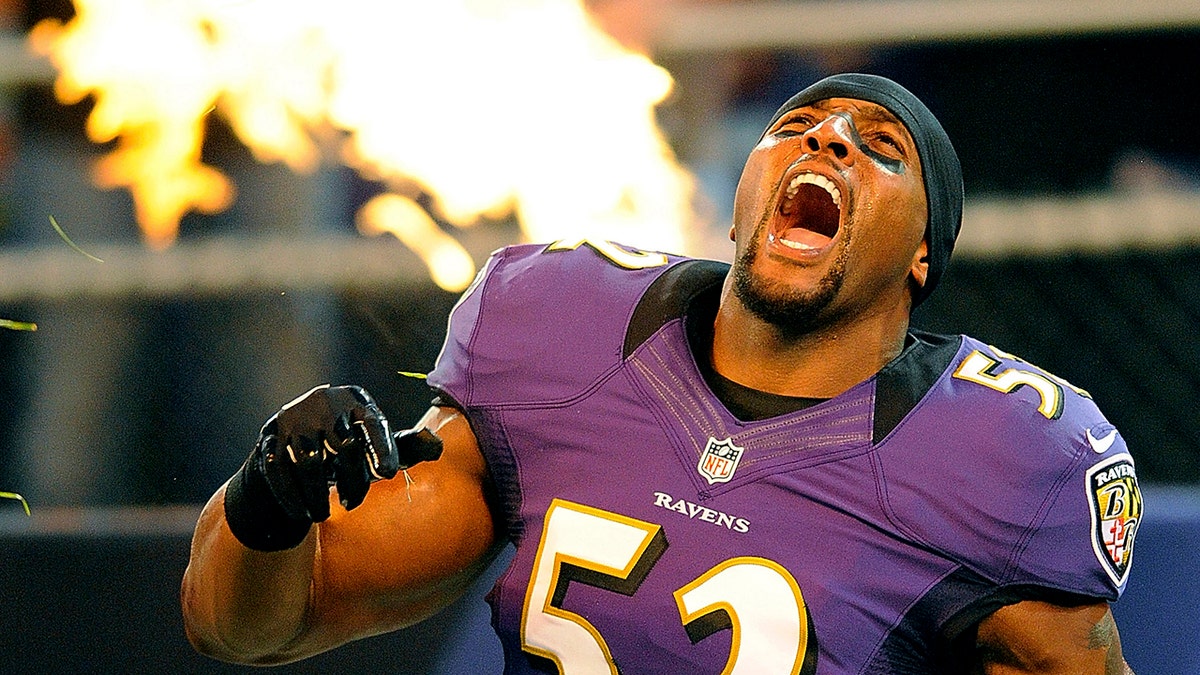
FILE - In this Aug. 17, 2012, file photo, Baltimore Ravens linebacker Ray Lewis reacts as he is introduced before an NFL preseason football game against the Detroit Lions in Baltimore. Lewis was elected to the Pro Football Hall of Fame on Saturday, Feb. 3, 2018. (AP Photo/Nick Wass, File)
Ray Lewis, the retired NFL middle linebacker who’ll be among the former players inducted Saturday into the Pro Football Hall of Fame, apparently was more than just a great star who helped the Baltimore Ravens win two Super Bowl titles.
He says he was also a one-man crime-fighting force.
“When I played, crime went lower in Baltimore,” Lewis said Friday, according to ESPN’s Jamison Hensley. "It’s like, nobody needs to be mad now. It’s like everybody wants to be happy and celebrate.”
Lewis, 43, a native of Bartow, Fla., played college football at Miami before embarking on a 17-year career with the Ravens from 1996 to 2012. In his pro years, he amassed more than 2,000 tackles, had 31 interceptions and even scored three touchdowns as a defender.
He helped Baltimore defeat the New York Giants, 34-7, in Super Bowl XXXV in Tampa, Fla., in January 2001, capturing the game’s MVP trophy in the process, and then helped them defeat the San Francisco 49ers, 34-31, in Super Bowl XLVII in New Orleans, in what would be the final game of his career.
Whether Lewis’ playing days had a direct impact on crime in Baltimore is debatable, but City-Data.com, a website that tracks crime statistics, provides “crime index” numbers for the city from 2002 to 2016, roughly parallel with Lewis’ NFL career.
According to the site, the U.S. average score is 280.5 (based on the number of murders, rapes, robberies, assaults and other major crimes per 100,000 population).
Baltimore had a crime index score of 908.2 in 2002, far higher than the U.S. average, but all subsequent years through 2016 were lower, with scores for the years 2009 through 2014 all below 700.
Meanwhile, it’s undeniable that the city’s crime has increased since Lewis retired. The city set a record for homicides in 2017, with 343 killings, or roughly 56 killings per 100,000 people, according to the Associated Press.
The homicide rate began to climb in 2015, after the death of Freddie Gray, a black man who suffered a fatal spinal injury while in police custody, the AP reported.
The rise is also reflected in the City-Data.com statistics.
In 2000, Lewis was associated with the stabbing deaths of two men – Jacinth Baker, 21, and Richard Lollar, 24 – during a brawl outside an Atlanta nightclub.
Lewis avoided murder charges in the case by taking a plea deal to testify against two of his friends, both of whom were ultimately acquitted -- as their self-defense argument apparently convinced the jury. Lewis was present, but not involved in the actual stabbings, CBS Baltimore reported.
In 2015, he also laid out his defense in the book, "I Feel Like Going On." He claimed that he got into a limousine and fled the scene as soon as the trouble started, the New York Post reported.
The plea deal included Lewis’ admission that he had given a misleading statement to police by initially telling them he was not present at the scene of the crime.
Lewis was sentenced to a year of probation, during which he was ordered to avoid drugs and alcohol, but there were other penalties: The NFL fined him $250,000, and although he was the Super Bowl MVP in 2001, a traditional post-game TV commercial for Disney World starred one of his teammates instead.
In 2004, Lewis reached out-of-court settlements in civil cases with family members of the men who were killed. Details of the agreements haven’t been made public.
The CBS Baltimore report contends that had Lewis never taken the plea deal, he likely would have been acquitted, just as the other two defendants were. Instead, Lewis was the only one to pay any kind of legal price in connection with the deaths.
Much of the speculation surrounding Lewis stems from the fact that his clothing from the night of the deaths was never seen again.
Handsome Lollar, 28, a surviving younger brother of Richard Lollar, told the Baltimore Sun this week that he still believes Lewis is guilty of a more serious crime in connection with the Atlanta case. He told the newspaper that Lewis’ induction into the Hall of Fame was “a black eye to the NFL.”
A Ravens spokesman told the Sun that Lewis was unavailable to talk about the 2000 case. But Lewis did comment about it in 2010, the newspaper reported.
“No day leaves this Earth,” Lewis told the Sun, “without me asking God to ease the pain of anybody who was affected by that whole ordeal.”








































